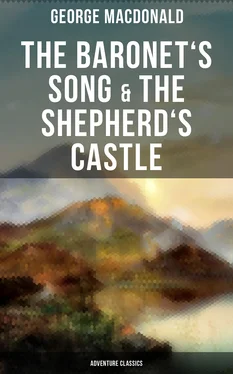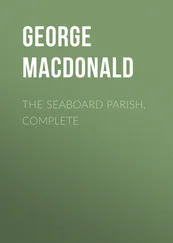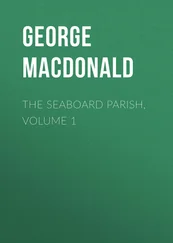The sunbeams he sought came down through the smoky air like a Jacob's ladder, and he stood at the foot of it like a little prodigal angel that wanted to go home again, but feared it was too much inclined for him to manage the ascent in the present condition of his wings. But all he did want was to see in the light of heaven what the gutter had yielded him. He held up his find in the radiance and regarded it admiringly. It was a little earring of amethyst-coloured glass, and in the sun looked lovely. The boy was in an ecstasy over it. He rubbed it on his sleeve, sucked it to clear it from the last of the gutter, and held it up once more in the sun, where, for a few blissful moments, he contemplated it speechless. He then caused it to disappear somewhere about his garments—I will not venture to say in a pocket—and ran off, his little bare feet sounding thud, thud, thud on the pavement, and the collar of his jacket sticking halfway up the back of his head, and threatening to rub it bare as he ran. Through street after street he sped—all built of granite, all with flagged footways, and all paved with granite blocks—a hard, severe city, not beautiful or stately with its thick, grey, sparkling walls, for the houses were not high, and the windows were small, yet in the better parts, nevertheless, handsome as well as massive and strong.
To the boy the great city was but a house of many rooms, all for his use, his sport, his life. He did not know much of what lay within the houses; but that only added the joy of mystery to possession: they were jewel-closets, treasure-caves, indeed, with secret fountains of life; and every street was a channel into which they overflowed.
It was in one of quite a third-rate sort that the urchin at length ceased his trot, and drew up at the door of a baker's shop—a divided door, opening in the middle by a latch of bright brass. But the child did not lift the latch—only raised himself on tiptoe by the help of its handle, to look through the upper half of the door, which was of glass, into the beautiful shop. The floor was of flags, fresh sanded; the counter was of deal, scrubbed as white almost as flour; on the shelves were heaped the loaves of the morning's baking, along with a large store of scones and rolls and baps—the last, the best bread in the world—biscuits hard and soft, and those brown discs of delicate flaky piecrust, known as buns. And the smell that came through the very glass, it seemed to the child, was as that of the tree of life in the Paradise of which he had never heard. But most enticing of all to the eyes of the little wanderer of the street were the penny-loaves, hot smoking from the oven—which fact is our first window into the ordered nature of the child. For the main point which made them more attractive than all the rest to him was, that sometimes he did have a penny, and that a penny loaf was the largest thing that could be had for a penny in the shop. So that, lawless as he looked, the desires of the child were moderate, and his imagination wrought within the bounds of reason. But no one who has never been blessed with only a penny to spend and a mighty hunger behind it, can understand the interest with which he stood there and through the glass watched the bread, having no penny and only the hunger. There is at least one powerful bond, though it may not always awake sympathy, between mudlark and monarch—that of hunger. No one has yet written the poetry of hunger—has built up in verse its stairs of grand ascent—from such hunger as Gibbie's for a penny-loaf up—no, no, not to an alderman's feast; that is the way down the mouldy cellar-stair—but up the white marble scale to the hunger after righteousness whose very longings are bliss.
Behind the counter sat the baker's wife, a stout, fresh-coloured woman, looking rather dull, but simple and honest. She was knitting, and if not dreaming, at least dozing over her work, for she never saw the forehead and eyes which, like a young ascending moon, gazed at her over the horizon of the opaque half of her door. There was no greed in those eyes—only much quiet interest. He did not want to get in; had to wait, and while waiting beguiled the time by beholding. He knew that Mysie, the baker's daughter, was at school, and that she would be home within half an hour. He had seen her with tear-filled eyes as she went, had learned from her the cause, and had in consequence unwittingly roused Mrs. Croale's anger, and braved it when aroused. But though he was waiting for her, such was the absorbing power of the spectacle before him that he never heard her approaching footsteps.
"Lat me in," said Mysie, with conscious dignity and a touch of indignation at being impeded on the very threshold of her father's shop.
The boy started and turned, but instead of moving out of the way, began searching in some mysterious receptacle hid in the recesses of his rags. A look of anxiety once appeared, but the same moment it vanished, and he held out in his hand the little drop of amethystine splendour. Mysie's face changed, and she clutched it eagerly.
"That's rale guid o' ye, wee Gibbie!" she cried. "Whaur did ye get it?"
He pointed to the kennel, and drew back from the door.
"I thank ye," she said heartily, and pressing down the thumbstall of the latch, went in.
"Wha's that ye're colloguin' wi', Mysie?" asked her mother, somewhat severely, but without lifting her eyes from her wires. "Ye maunna be speykin' to loons i' the street."
"It's only wee Gibbie, mither," answered the girl in a tone of confidence.
"Ou weel!" returned the mother, "he's no like the lave o' loons."
"But what had ye to say till him?" she resumed, as if afraid her leniency might be taken advantage of. "He's no fit company for the likes o' you, 'at his a father an' mither, an' a chop (shop). Ye maun hae little to say to sic rintheroot laddies."
"Gibbie has a father, though they say he never hid nae mither," said the child.
"Troth, a fine father!" rejoined the mother, with a small scornful laugh. "Na, but he's something to mak mention o'! Sic a father, lassie, as it wad be tellin' him he had nane! What said ye till 'im?"
"I bit thankit 'im, 'cause I tint my drop as I gaed to the schuil i' the mornin', an' he fan't till me, an' was at the chopdoor waitin' to gie me't back. They say he's aye fin'in' things."
"He's a guid-hertit cratur!" said the mother,—"for ane, that is, 'at's been sae ill broucht up."
She rose, took from the shelf a large piece of bread, composed of many adhering penny-loaves, detached one, and went to the door.
"Here, Gibbie!" she cried as she opened it; "here's a fine piece to ye."
But no Gibbie was there. Up and down the street not a child was to be seen. A sandboy with a donkey cart was the sole human arrangement in it. The baker's wife drew back, shut the door and resumed her knitting.
Table of Contents
The sun was hot for an hour or two in the middle of the day, but even then in the shadow dwelt a cold breath—of the winter, or of death—of something that humanity felt unfriendly. To Gibbie, however, bare-legged, bare-footed, almost bare-bodied as he was, sun or shadow made small difference, except as one of the musical intervals of life that make the melody of existence. His bare feet knew the difference on the flags, and his heart recognized unconsciously the secret as it were of a meaning and a symbol, in the change from the one to the other, but he was almost as happy in the dull as in the bright day. Hardy through hardship, he knew nothing better than a constant good-humoured sparring with nature and circumstance for the privilege of being, enjoyed what came to him thoroughly, never mourned over what he had not, and, like the animals, was at peace. For the bliss of the animals lies in this, that, on their lower level, they shadow the bliss of those—few at any moment on the earth—who do not "look before and after, and pine for what is not," but live in the holy carelessness of the eternal now. Gibbie by no means belonged to the higher order, was as yet, indeed, not much better than a very blessed little animal.
Читать дальше












